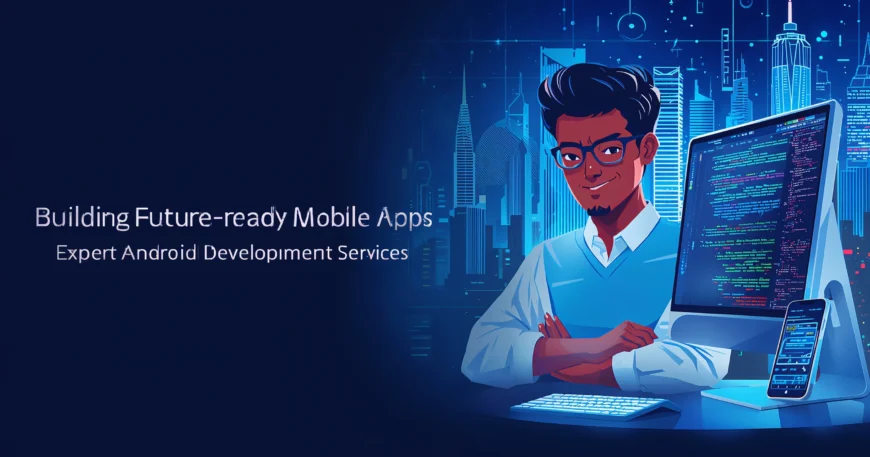In today’s fast-paced world, mobile applications have become a cornerstone of modern business operations. From simplifying day-to-day tasks to enhancing user engagement, mobile apps serve as a vital tool for businesses across industries. Among the most popular platforms for mobile app development is Android, which holds a significant market share in the global smartphone industry. As businesses look towards building mobile apps that can cater to the needs of future users, it’s essential to rely on expert Android development services to create future-ready applications.
The Importance of Mobile Apps in Modern Business
The mobile app industry has seen exponential growth, with billions of users relying on apps to meet their daily needs. The increasing usage of mobile devices has opened up new opportunities for businesses to engage with customers and streamline operations. With apps providing a wide range of features, from e-commerce to customer support, having a robust mobile presence is no longer optional.
For businesses, having a mobile app can:
- Boost customer engagement: Apps offer direct communication channels through push notifications, allowing businesses to engage with their customers in real-time.
- Enhance brand presence: An intuitive and well-designed app can significantly elevate a brand’s identity and visibility.
- Improve operational efficiency: Apps help streamline business operations, automate tasks, and improve productivity.
- Provide better customer insights: Through app analytics, businesses can gather valuable data on customer behavior and preferences, enabling informed decisions.
However, to fully realize these benefits, businesses need to ensure that their apps are not only effective but also future-ready, adaptable to new trends and technologies that will shape the mobile landscape.
What Makes an Android App “Future-Ready”?
A future-ready Android app is one that anticipates and adapts to changes in both the technological landscape and user behavior. As mobile technology continues to evolve, Android development must stay ahead of the curve to ensure that apps remain relevant, secure, and user-friendly. Some key factors that make an Android app future-ready include:
1. Adherence to Modern Design Principles
Design is at the heart of user experience (UX). A future-ready Android app should adhere to modern design principles, ensuring it remains visually appealing and intuitive for users. The Material Design guidelines by Google provide a solid foundation for creating sleek, user-friendly interfaces that work seamlessly across various devices and screen sizes. These guidelines focus on:
- Clean layouts
- Consistent color schemes
- Smooth animations
- Easy-to-use navigation
Future-ready Android apps should not only follow these design trends but also incorporate advanced UI/UX features like dark mode, responsive layouts, and voice-controlled interfaces to provide enhanced user experiences.
2. Incorporating AI and Machine Learning
Artificial Intelligence (AI) and Machine Learning (ML) are transforming how apps operate. From intelligent chatbots to personalized content recommendations, AI is quickly becoming a must-have feature in future-ready apps. Android developers must harness these technologies to create applications that:
- Provide personalized experiences for users
- Enable voice-based interactions (like Google Assistant integration)
- Enhance app security with biometric authentication
- Optimize performance by learning user behavior and adapting app usage accordingly
AI-driven mobile apps can automate processes, save time for users, and anticipate user needs, making them highly attractive to businesses looking to stay ahead in a competitive landscape.
3. Cross-Platform Compatibility
While Android has a massive global market share, businesses must also cater to users on other platforms like iOS. As the demand for cross-platform apps grows, businesses are turning towards technologies like Flutter, React Native, and Xamarin to create apps that work seamlessly across both Android and iOS.
Cross-platform app development allows businesses to:
- Reach a broader audience by supporting multiple operating systems
- Save time and money by writing a single codebase for both platforms
- Ensure a consistent user experience across devices
By building cross-platform apps, businesses can ensure they are prepared for the future, where user expectations include seamless interactions across all devices.
4. Incorporating IoT (Internet of Things) Integration
As smart devices and wearables continue to rise in popularity, apps must integrate with these devices to offer enhanced functionality. The integration of IoT capabilities in mobile apps is already revolutionizing industries like healthcare, retail, and logistics. Future-ready Android apps should:
- Support integration with smart home devices (e.g., lighting, thermostats, and security systems)
- Collect and analyze data from connected devices (e.g., fitness trackers or medical devices)
- Enable remote monitoring and control through the app
By leveraging IoT, businesses can offer a broader range of services, improve operational efficiency, and provide a more holistic experience for users.
5. Enhanced Security Features
As cyber threats continue to evolve, ensuring the security of mobile apps has become more critical than ever. Future-ready Android apps must adopt state-of-the-art security measures to protect user data and prevent malicious activities. Some advanced security features include:
- Biometric authentication (e.g., fingerprint, facial recognition)
- End-to-end encryption to secure user data during transmission
- Secure APIs to protect the app’s backend
- Two-factor authentication for an extra layer of protection
With the growing concerns around privacy, building apps with robust security features is no longer just a recommendation but a necessity.
6. Cloud Integration
Cloud computing offers businesses the ability to scale their apps quickly without the need for complex infrastructure. Future-ready Android apps should leverage cloud technology to provide:
- Seamless data storage and retrieval
- High availability and uptime
- Scalable resources to handle traffic spikes
- Synchronization of app data across multiple devices
By incorporating cloud technology, businesses can ensure that their apps are not only prepared for future growth but also adaptable to new features and functionality.
7. Performance Optimization
As users become more demanding, app performance is critical to keeping them engaged. Future-ready Android apps should:
- Offer fast loading times (even in low network conditions)
- Optimize battery usage
- Ensure smooth animations and transitions
- Regularly update to improve performance
Android developers must use efficient coding practices and tools like Android Jetpack, Kotlin Coroutines, and ProGuard to optimize app performance and maintain a high-quality user experience.
Choosing the Right Android Development Service
Building a future-ready mobile app requires expertise, innovation, and experience. This is why partnering with a professional Android development service is crucial for businesses that want to stay ahead in the ever-evolving mobile space. Expert Android developers bring a wealth of knowledge to the table, ensuring that your app is not only functional but future-proof.
Here are a few key aspects to look for when selecting an Android development service:
-
Experience in building scalable apps: Ensure that the development service has experience in building apps that can scale as your user base grows.
-
Proficiency in modern development tools and technologies: Choose a service that is well-versed in the latest tools, frameworks, and technologies like Kotlin, Jetpack, Flutter, and React Native.
-
Strong focus on security: Ensure that the development team implements best practices for securing user data and preventing vulnerabilities.
-
User-centric approach: Choose a development team that focuses on creating apps with an exceptional user experience.
-
Post-launch support: Future-ready apps need regular updates and maintenance to stay relevant. Choose a team that offers post-launch support and app updates.
Conclusion
As mobile technology continues to evolve, businesses must adapt to these changes to stay competitive. Building future-ready Android apps involves staying ahead of design trends, integrating advanced technologies like AI, ensuring cross-platform compatibility, and prioritizing security. By partnering with expert Android development services, businesses can create mobile apps that not only meet the current needs of users but also adapt to future innovations, ensuring long-term success in the ever-changing digital landscape.



